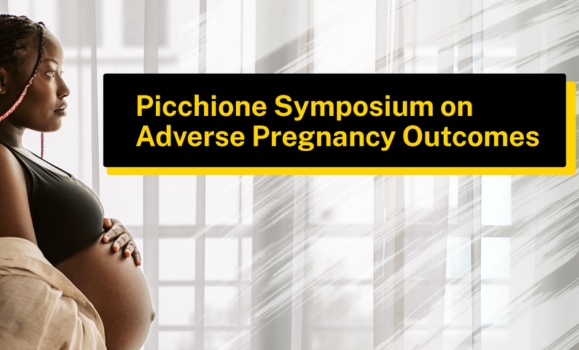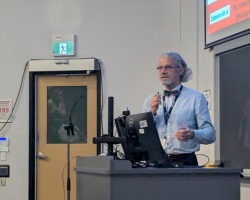We can and should be doing better
» Go to news main2025 Picchione Symposium Confronts the Crisis in Maternal and Infant Health

In a room filled with distinguished scientists, physicians, and politicians, numbers flashed silently on the screen; 1, 2, 3…all the way to 16. These 16 seconds marked a stillbirth somewhere in the world. Almost four babies every minute.
A stark statistic followed by two more; Every two minutes, a mother dies from complications related to pregnancy or childbirth and every two seconds, a child is born prematurely.
This sobering data opened the 2025 Picchione Symposium: Adverse Pregnancy Outcomes, hosted by the Canadian Center for Vaccinology (CCfV), Dalhousie University, the Infection, Immunity, Inflammation and Vaccinology (I3V) research team, and IWK Health, setting the tone for a day of urgent consideration and bold ideas.
Dr. Krista Jangaard, President and CEO of IWK Health, welcomed attendees with a call to action: to confront the persistent and preventable tragedies in maternal and infant health with innovation and collaboration.
 The day’s organizer, Dr. Tobias Kollmann, a pediatric infectious disease expert at Dalhousie University, delivered the opening keynote with a powerful reminder: preterm birth remains the leading cause of infant death and disability—a crisis that demands urgent attention.
The day’s organizer, Dr. Tobias Kollmann, a pediatric infectious disease expert at Dalhousie University, delivered the opening keynote with a powerful reminder: preterm birth remains the leading cause of infant death and disability—a crisis that demands urgent attention.
But Dr. Kollmann’s message was not one of despair.
“Scientific insight and determination can bring change,” he emphasized, laying the groundwork for a day focused not only on the crisis but on the solutions within reach.
The Legacy of the Picchione Visiting Professor Program
The symposium is part of the Picchione Visiting Professor Program, a long-standing initiative made possible through the generosity of Dr. Pasquale (Vincent) and Susan Picchione. Established in 1988 and now endowed within Dalhousie’s Faculty of Medicine, the program brings distinguished scholars to campus for extended visits, fostering meaningful engagement with students, faculty, and the broader medical community.
For alumni and donors, the Picchione Program is more than a prestigious lecture; it’s a testament to the enduring impact of philanthropy on medical education and research.
The 2025 Picchione Symposium was designed to catalyze change, and Dr. Kollmann believes it will do just that.
“We’ve gathered the world’s leading experts to showcase that if we were to combine the early identification of risk factors via innovative technologies, followed by targeted interventions, we could save 90 per cent of health care costs related to preterm birth and, more importantly, 78 per cent of lives lost,” Dr. Kollmann says.
“This network of global leaders has now partnered with local experts from Indigenous and rural Atlantic Canadian communities to usher in an end to the longest-standing, deadliest pandemic we’ve ever faced.”
The Cost of Cultural Erasure
 Among the most moving moments of the day came from Elizabeth (Liz) LaSaga, former Chief of the Flat Bay Band in rural Newfoundland. She recounted the story of her grandmother, who gave birth to 14 children at home using traditional Mi’kmaw birthing and midwifery practices. With the dissolution of traditional practices and the shift toward hospital births, she delivered her 15th child in a hospital—where both she and the baby tragically died.
Among the most moving moments of the day came from Elizabeth (Liz) LaSaga, former Chief of the Flat Bay Band in rural Newfoundland. She recounted the story of her grandmother, who gave birth to 14 children at home using traditional Mi’kmaw birthing and midwifery practices. With the dissolution of traditional practices and the shift toward hospital births, she delivered her 15th child in a hospital—where both she and the baby tragically died.
Her story underscored the symposium’s broader message that health outcomes, especially of marginalized and racialized populations, are deeply intertwined with history, identity, and systemic inequities.
LaSaga’s husband, Dr. Stew MacNeil, originally from Stephenville Crossing, a small city on the west coast of Newfoundland, shared his experiences working in hospitals in Edmonton, Alberta, early in his career. As an Indigenous man who passes as Caucasian with Scottish ancestry, he was privy to the mistreatment of Indigenous people in healthcare settings, including pregnant and birthing women.
Then and now, Dr. MacNeil challenges the clinical lens through which birth is often viewed.
“There is an art to medicine,” he said. “Birth is not just a medical event—it’s a natural, cultural, and human experience.”
The stories shared by Ms. LaSaga and Dr. MacNeil are not just reflections on the past—they are also shaping the future. Together with Dr. Kollmann, they are leading a research initiative aimed at transforming pregnancy care for rural and Indigenous communities in Atlantic Canada.
The project, titled “Empowering the Disempowered: Remote Pregnancy Monitoring to Reduce Adverse Pregnancy Outcomes in Rural and Indigenous Populations of Atlantic Canada,” is built on a simple but powerful idea: that early, non-invasive pregnancy monitoring—using wearable technologies like smartwatches—can help identify pregnancies at risk for adverse outcomes before complications arise.
By combining these tools with community-led implementation strategies, the team hopes to shift the focus from crisis management to prevention.
“This is about co-creating solutions with the communities most affected,” says Dr. Kollmann. “We’re not just testing technology—we’re building trust, blending traditional knowledge with cutting-edge science, and empowering change.”
The project is already underway in partnership with Indigenous communities across Nova Scotia and Newfoundland, as well as Women’s Centres Connect, which serves rural women across the province. It represents a bold step toward equity in maternal health—one that acknowledges the legacy of harm while charting a new path forward.
Preventable Losses, Proven Solutions
Dr. Heather Scott, a maternal health consultant with the World Health Organization and Dalhousie faculty member, brought a global perspective. She noted that in 2023, 700 women died every day from preventable causes during childbirth. Nearly 40 per cent of infant deaths occur during labour—most of them avoidable.
She outlined both the adverse outcomes—like eclampsia, hemorrhage, sepsis, infection—and the evidence-based interventions that can reduce risk, such as iron and folic acid supplementation, early detection of hypertension, group prenatal care, and culturally respectful practices.
But poverty, limited access to care, geographic isolation, and systemic inequities remain barriers to many.
“Progress has been great,” she said, “but it hasn’t been enough.”
Innovation at the Intersection of Biology and Technology
Dr. SingSing Way, pediatrician and immunologist at Cincinnati Children's Hospital Medical Center in Ohio, explores how pregnancy reshapes the immune system.
Dr. Way’s research suggests that the body “remembers” previous pregnancies in ways similar to how it responds to vaccines—offering a potential path to reducing complications in first-time pregnancies.
“Every single mother was once a daughter,” he said. “And during pregnancy, cells are exchanged between mother and baby. One in a million cells in a woman’s body after pregnancy are from her child—and vice versa. This biological connection could hold the key to understanding and preventing complications.”
Dr. Nima Aghaeepour, a leader in health data analysis using advanced computing and artificial intelligence and machine learning, followed with a provocative hypothesis. Can we tell if a 50-year-old was born prematurely? His research suggests that we can—and that this insight could lead to early interventions that improve lifelong health outcomes.
Premature birth, he noted, is linked to increased risk of diabetes, Chronic Obstructive Pulmonary Disease (COPD), and hypertension later in life. Artificial intelligence (AI), he argued, can bridge the gap between biological data and clinical decision-making. From predictive models to telemedicine tools, AI offers a powerful new frontier in maternal and infant health.
A Path Forward
The crisis of adverse maternal and infant outcomes is vast, touching every corner of the globe and disproportionately affecting marginalized communities. Yet, there are proven interventions that can significantly reduce risks.
The challenge now lies not in finding solutions, but in ensuring that current insights are implemented equitably, effectively, and urgently.
“We will make a difference,” says Dr. Kollmann. “And it will start at Dalhousie.”
Recent News
- Canadian Medical Hall of Fame Award for Students: Jeremiah Philips
- Dal’s 2025 research awards
- Six accomplished individuals honoured as notable Dal alumni
- New hope for for Fabry patients
- New associate dean, UGME, Dr. Ian Epstein’s vision for medical education
- 2025 Picchione Symposium Confronts the Crisis in Maternal and Infant Health
- Dalhousie Medicine Opens Class of 2000 Time Capsule
- Partnership prompts 'I can be a doctor here' moments
